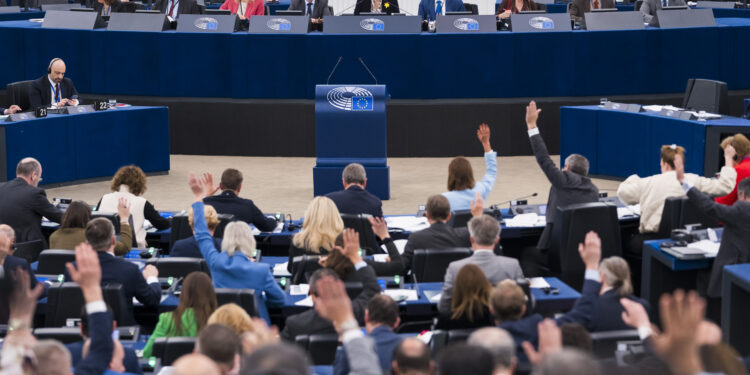From the Correspondent in Strasbourg – The European Parliament approved next year’s budget guidelines, calling (again) for own resources and investment in defense, climate protection, employment, and innovation. It will be the starting point for the Commission to formulate its legislative proposal, on which it must then negotiate with MEPs and national governments.
With a resolution passed by a large majority – 441 “yes,” 173 “no,” and 70 abstentions – MEPs today (April 2) adopted the Guidelines of the European Parliament on the Community budget for the 2026 fiscal year, the penultimate of the 2021-2027 multi-annual financial framework (MFF).
The House’s guidelines commit the Union to “building a resilient, sustainable and prosperous future” for its citizens, keeping in mind strategic dimensions prioritized in these times of global instability. The premise of the report — entrusted to Popular Poland’s Andrzej Halicki and backed by the five groups of the enlarged “Ursula majority” of Greens and Conservatives — is that the EU faces several “uncertainties,” including the Ukraine war, geopolitical upheavals, the biodiversity crisis and the worsening effects of climate change.
Hence, there is a need to improve continental defense and security capabilities, an imperative to increase the economic competitiveness of the 27 member states, an urgency to build real climate resilience, and a need to strengthen the single market. According to the Chamber, the budget in the next fiscal year should channel resources to key areas, including security and defense, research, innovation, business (with a focus on SMEs), health, energy, migration, external border protection (maritime and land), digital and green transitions, and labor and employment.
Finally, yet again, the European Parliament calls for fresh resources for the EU (also to pay interest on debts incurred with the NextGeneration EU) and “regrets” the lack of progress at the Council on the issue.
On Monday (March 31), on the first day of the plenary currently underway in Strasbourg, members of the hemicycle discussed their priorities with Budget Commissioner Piotr Serafin. The Pole urged MEPs to support “a strong budget” to secure the Union “at a time of growing global pressures” amid crazed diplomacies that fail to end ongoing bloody wars, aggressive adversaries, and old allies who no longer behave as such.
To effectively adopt the 2026 Draft Budget, the EU executive must make a formal legislative proposal considering the guidelines of the co-legislators, the Parliament, and the Council. Member states adopted their guidelines on February 18, while the House Budget Committee (BUDG) approved its report on March 20. The first trilogue between the negotiators from the three institutions (the co-legislators plus the Commission) will be on April 8, while the Berlaymont initiative is expected in early June.
English version by the Translation Service of Withub






